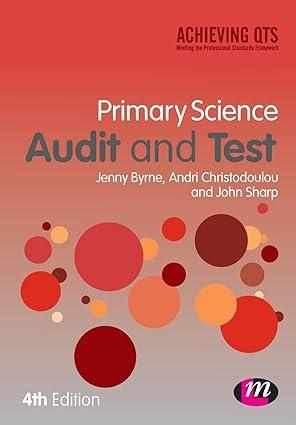Question
The assumptions used to develop the pro forma financial statements were used by Stewart and Ford as a starting point. Historical information and current market
The assumptions used to develop the pro forma financial statements were used by Stewart and Ford as a starting point. Historical information and current market conditions were also used in developing the cash budget assumptions.
1. A minimum $20,000 cash balance will be maintained.
2. The company has negotiated a $200,000 line of credit for short-term cash needs. Cash Inflows
3. Ford stated that the primary cash inflow will be the collection of accounts receivables. Projected revenue for the year is $6,000,000 and monthly sales forecasts were provided by the marketing department.
2006 (actual)
November 260,000
December 326,000
2007 (projected)
January 240,000
February 300,000
March 360,000
April 360,000
May 420,000
June 480,000
July 540,000
August 600,000
September 660,000
October 720,000
November 720,000
December 600,000
Total 6,000,000
2008 (projected)
January 280,000
February 350,000
4. Ford indicated that last year receivables were collected as follows:
Current Month - 20% of sales
1 month after - 50% of sales
2 months after - 30% of sales
Ford thought the new credit policy implemented by the new credit manager should allow an acceleration of collections in the coming year. The projected collection schedule for 2007 is:
Current Month - 25% of sales
1 month after - 60% of sales
2 months after - 15% of sales
Stewart suggested they use the 2007 collection assumptions for the cash budget. For example, 25% of January sales will be collected in January, 60% of January sales will be collected in February and 15% of January sales will be collected in March. Note: 15% of 2006 November sales and 60% of 2006 December sales will be collected in January and 15% of December 2006 sales will be collected during February. Ford stated there would a small amount of bad debts in 2007 but for planning purposes these would be ignored.
Cash Outflows
5. The purchase of inventory represents the largest cash outflow. Inventory is typically purchased two months prior to expected sales and is paid in the month of purchase. Example, inventory for January sales would be purchased in November and paid for in November. Inventory for February sales would be purchased and paid for in December, etc. Cost of Goods Sold in 2007 were 76% of sales, assume that 2008 cost of goods sold will also be 76% of sales.
6. Annual plant operating expenses were projected to total $688,500. Ford suggested that these expenses be distributed equally over the twelve months. She stated that in some cases this was probably an over simplification but a reasonable assumption. Stewart agreed. Example: One twelfth, or $4,375, of the annual manager salary and benefits of $52,500 will be distributed monthly.
Plant Operating Expenses
Manager (salary and benefits) 52,500
Employees (wages and benefits) 225,000
Lease Expense 72,000
Utilities Expense 12,000
Repairs & Maintenance Expense 6,000
Supplies Expense 9,000
Delivery Expense 120,000
Miscellaneous Expense 12,000
Total 688,50
7. Selling Expenses were projected at $301,500 for the year. Ford stated that most could be spread evenly over the twelve months. The exceptions would be Commissions and Promotion and Advertising. Commissions are paid in the month following the end of a quarter and will be allocated based on sales for the previous quarter. Example: ($30,000 *first quarter sales/annual sales). The accounts payable on the 2006 year end balance sheet represents the fourth quarter 2006 commissions that will be paid in January of 2007. One fourth of the annual promotion and advertising expense will be spent during the first month of each quarter.
Selling Expenses
Sales Representatives 105,000
T&E 36,000
Commissions 30,000
Auto Expense 24,000
Internal Sales Representatives 52,500
Promotion and Advertising 54,000
Total 301,500
8. Annual general administrative expenses will be treated the same as plant operating expenses. These expenses will be distributed equally over the twelve months.
General Administrative Expenses
Officer's Salaries 83,700
T&E 24,000
Auto Expense 12,000
Administrative Staff 52,500
Utility Expense 12,000
Office Supplies 12,000
Insurance 36,000
Legal & Professional 6,000
Miscellaneous 6,000
244,200
9. Annual interest expense is forecasted to total $90,000 and interest payments are made in the third month of each quarter. Again for simplicity purposes, Ford suggested the $90,000 be spread evenly over the four quarters.
10. Capital expenditures for the year include a $40,000 expansion to the warehouse and $20,000 for new drum filling equipment. The warehouse expansion is scheduled for April and the equipment acquisition for June. Assume the expenditures are paid for in the month of their installation. The depreciation expense associated with the projects is included in $180,000 projected for the year. 11. Income taxes are expected to total $34,740 and payments are made quarterly with the first payment of 2007 taxes to be made in April. The $34,740 will be spread evenly over the four quarters. The taxes payable on the year end 2006 balance sheet will be paid in January of 2007.
Construct a monthly cash budget for Cape Chemical for the period January through December 2007. Assume that all cash flows occur on the 15th of each month. Is the current $200,000 line of credit sufficient to meet the needs of Cape Chemical during the year? Explain your answer.
Step by Step Solution
There are 3 Steps involved in it
Step: 1

Get Instant Access to Expert-Tailored Solutions
See step-by-step solutions with expert insights and AI powered tools for academic success
Step: 2

Step: 3

Ace Your Homework with AI
Get the answers you need in no time with our AI-driven, step-by-step assistance
Get Started


